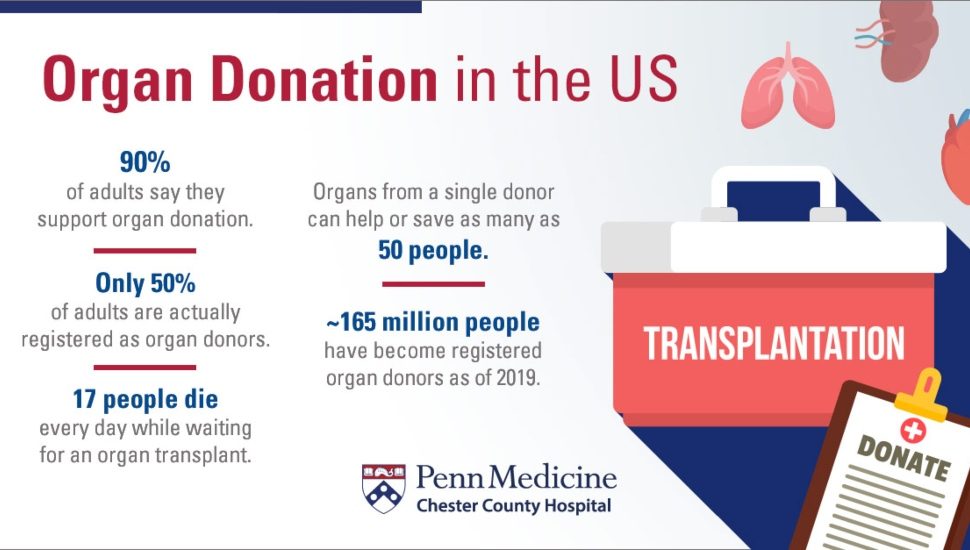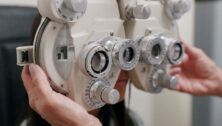April Is National Donate Life Month. Doylestown Hospital Encourages You to Register as an Organ Donor


Nine minutes is a surprisingly short amount of time. In nine minutes, you can unload the dishwasher (if it’s not too full), clear out your e-mail inbox (if it hasn’t been a while), or call a friend to say hello (if you can manage to keep it short).
In those same nine minutes, someone in the U.S. gets put onto the transplant waiting list, adding to the 107,000 men, women, and children who are already on it.
Organ donation is when healthy organs and tissues are taken from one person for transplantation into another. April is National Donate Life Month — a month to encourage Americans to register to donate and save lives.
This National Donate Life Month, consider registering as an organ donor to save lives. Here’s
what you should know about organ donation and how to register.
Who Is Eligible to Be an Organ Donor?
Despite common misconceptions, everybody can be a potential organ donor regardless of age, health status, race, or ethnicity. From newborns to those in their 90s, people of all ages have been organ donors.
What really matters is the health of your organs.
While many with an illness or a health condition can still be a donor, there are a few conditions that will prevent you from becoming a donor, including active cancer or an infection in the bloodstream. If the situation should arise, a healthcare provider will make sure your organs are suitable for donation.
Some people are hesitant to donate their organs due to religious concerns. However, many religions support organ donation. Learn more at OrganDonor.gov.
How Does Organ Donation Actually Work?
While organ donation is typically thought of for the heart, lungs, and kidney, there are a number of organs and tissues that can be donated, including:
- Pancreas
- Intestines
- Corneas (the outermost layer of your eyes, which allows you to focus your vision)
- Tissues such as heart valves, skin, bone, and tendons
- Hands and face
- Blood stem cells, bone marrow, and cord blood (blood from the placenta and umbilical cord, which can be used to treat blood cancers and some disorders of the blood and immune system)
- Blood and platelets
Deceased donation is only possible in highly specific circumstances. In fact, only three in every 1,000 people die in a way that allows for successful organ donation.
The most common scenario is for a patient to arrive at the hospital due to severe head trauma, a brain aneurysm (a ballooning or weakened area in the wall of a blood vessel), or stroke. In these cases, the patient will be put on life support to keep blood flowing to their organs.
Keep in mind — if you’re ever admitted to the hospital, your healthcare providers’ number one priority is to save your life. Being an organ donor will not keep them from doing everything they can to keep you alive.
The Organ Donation Process
If providers have gone through all of the possible life-saving techniques, the organ donation process can begin:
- Providers will determine if brain death has occurred, which is when there is no brain activity and a patient is unable to breathe on their own. Brain death is irreversible.
- The hospital will communicate with the local Organ Procurement Organization (OPO). In Chester County, this is the Gift of Life Donor Program. They authorize the donation, including confirming the patient was a registered donor.
- Gift of Life will begin to search for an organ recipient while a transplant surgeon confirms that the organ is medically suitable for donation.
- The organ is transported — via ambulance, helicopter, or commercial airplane — to the hospital where the organ recipient is awaiting their new organ.
- The organ is transplanted into the organ recipient.
While most organ and tissue donations occur after the donor has died, there are organs that can be donated while you are alive, such as one kidney, part of your liver, or healthy cells from bone marrow. In fact, four out of every ten donations is a living donation. Learn more about the living donation process at OrganDonor.gov.
How to Register to Become an Organ Donor
Making the decision to become an organ donor is a highly personal one. If you do decide to become a donor, there are two ways to register:
- Sign up in person at your local motor vehicle department.
- Sign up online.
Have your driver’s license or government-issued photo ID readily available in order to register.
Then, make sure you tell your family you have registered. That way, they won’t be caught off guard and can support your wishes if the situation should arise.
Registering as an organ donor is a way to provide someone else the gift of life. The more donors that are registered, the higher the chance that someone in need of an organ will find a match. Consider registering today — and be a part of this life-saving process.
Questions about becoming an organ donor? Check out the information at Doylestown Hospital.
Connect With Your Community
Subscribe for stories that matter!
"*" indicates required fields





























